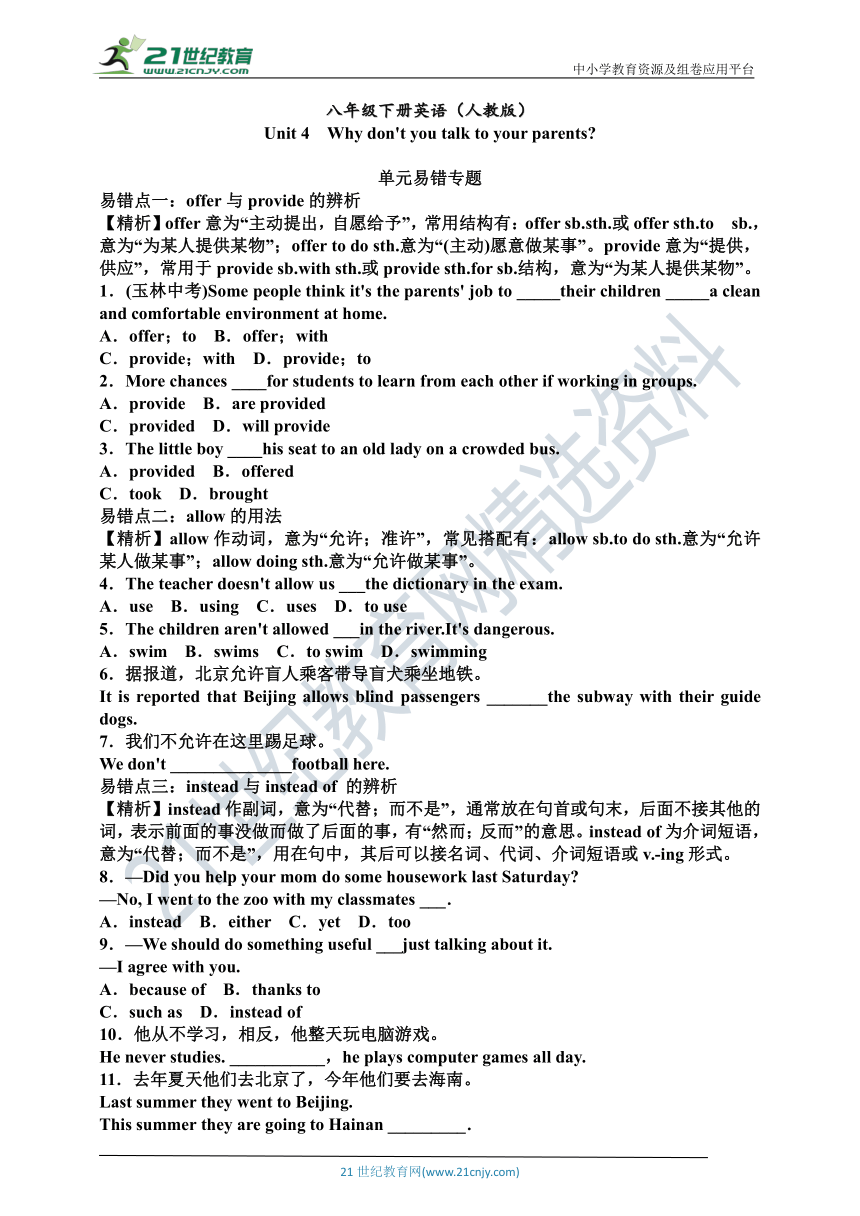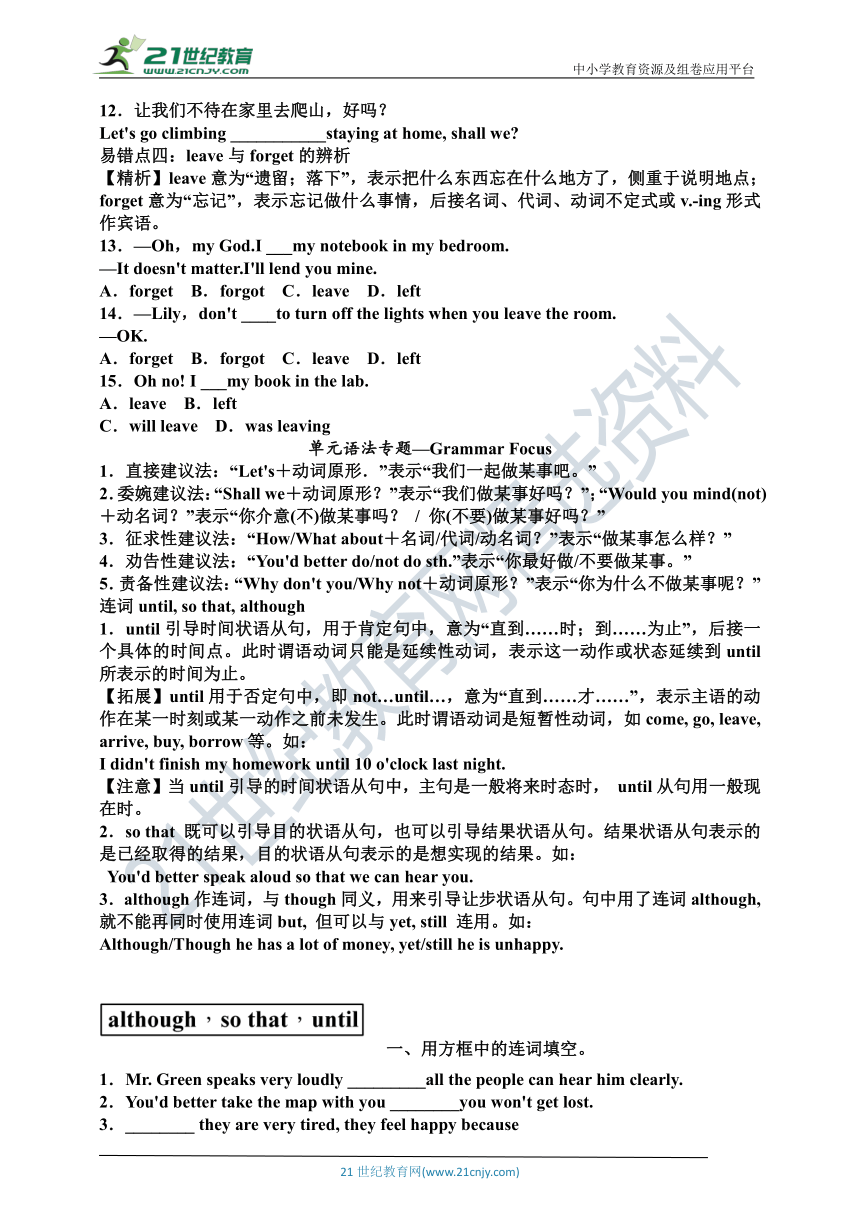Unit 4 Why don't you talk to your parents?单元易错点+语法题(含答案)
文档属性
| 名称 | Unit 4 Why don't you talk to your parents?单元易错点+语法题(含答案) |  | |
| 格式 | doc | ||
| 文件大小 | 189.5KB | ||
| 资源类型 | 试卷 | ||
| 版本资源 | 人教新目标(Go for it)版 | ||
| 科目 | 英语 | ||
| 更新时间 | 2021-02-22 17:59:41 | ||
图片预览


文档简介
中小学教育资源及组卷应用平台
八年级下册英语(人教版)
Unit 4 Why don't you talk to your parents?
单元易错专题
易错点一:offer与provide的辨析
【精析】offer意为“主动提出,自愿给予”,常用结构有:offer sb.sth.或offer sth.to sb.,意为“为某人提供某物”;offer to do sth.意为“(主动)愿意做某事”。provide意为“提供,供应”,常用于provide sb.with sth.或provide sth.for sb.结构,意为“为某人提供某物”。
1.(玉林中考)Some people think it's the parents' job to _____their children _____a clean and comfortable environment at home.
A.offer;to B.offer;with
C.provide;with D.provide;to
2.More chances ____for students to learn from each other if working in groups.
A.provide B.are provided
C.provided D.will provide
3.The little boy ____his seat to an old lady on a crowded bus.
A.provided B.offered
C.took D.brought
易错点二:allow的用法
【精析】allow作动词,意为“允许;准许”,常见搭配有:allow sb.to do sth.意为“允许某人做某事”;allow doing sth.意为“允许做某事”。
4.The teacher doesn't allow us ___the dictionary in the exam.
A.use B.using C.uses D.to use
5.The children aren't allowed ___in the river.It's dangerous.
A.swim B.swims C.to swim D.swimming
6.据报道,北京允许盲人乘客带导盲犬乘坐地铁。
It is reported that Beijing allows blind passengers _______the subway with their guide dogs.
7.我们不允许在这里踢足球。
We don't ______________football here.
易错点三:instead与instead of 的辨析
【精析】instead作副词,意为“代替;而不是”,通常放在句首或句末,后面不接其他的词,表示前面的事没做而做了后面的事,有“然而;反而”的意思。instead of为介词短语,意为“代替;而不是”,用在句中,其后可以接名词、代词、介词短语或v.?ing形式。
8.—Did you help your mom do some housework last Saturday?
—No, I went to the zoo with my classmates ___.
A.instead B.either C.yet D.too
9.—We should do something useful ___just talking about it.
—I agree with you.
A.because of B.thanks to
C.such as D.instead of
10.他从不学习,相反,他整天玩电脑游戏。
He never studies. ___________,he plays computer games all day.
11.去年夏天他们去北京了,今年他们要去海南。
Last summer they went to Beijing.
This summer they are going to Hainan _________.
12.让我们不待在家里去爬山,好吗?
Let's go climbing ___________staying at home, shall we?
易错点四:leave与forget的辨析
【精析】leave意为“遗留;落下”,表示把什么东西忘在什么地方了,侧重于说明地点;forget意为“忘记”,表示忘记做什么事情,后接名词、代词、动词不定式或v.?ing形式作宾语。
13.—Oh,my God.I ___my notebook in my bedroom.
—It doesn't matter.I'll lend you mine.
A.forget B.forgot C.leave D.left
14.—Lily,don't ____to turn off the lights when you leave the room.
—OK.
A.forget B.forgot C.leave D.left
15.Oh no! I ___my book in the lab.
A.leave B.left
C.will leave D.was leaving
单元语法专题—Grammar Focus
1.直接建议法:“Let's+动词原形.”表示“我们一起做某事吧。”
2.委婉建议法:“Shall we+动词原形?”表示“我们做某事好吗?”;“Would you mind(not)+动名词?”表示“你介意(不)做某事吗? / 你(不要)做某事好吗?”
3.征求性建议法:“How/What about+名词/代词/动名词?”表示“做某事怎么样?”
4.劝告性建议法:“You'd better do/not do sth.”表示“你最好做/不要做某事。”
5.责备性建议法:“Why don't you/Why not+动词原形?”表示“你为什么不做某事呢?”
连词until, so that, although
1.until引导时间状语从句,用于肯定句中,意为“直到……时;到……为止”,后接一个具体的时间点。此时谓语动词只能是延续性动词,表示这一动作或状态延续到until所表示的时间为止。
【拓展】until用于否定句中,即not…until…,意为“直到……才……”,表示主语的动作在某一时刻或某一动作之前未发生。此时谓语动词是短暂性动词,如come, go, leave, arrive, buy, borrow等。如:
I didn't finish my homework until 10 o'clock last night.
【注意】当until引导的时间状语从句中,主句是一般将来时态时, until从句用一般现在时。
2.so that 既可以引导目的状语从句,也可以引导结果状语从句。结果状语从句表示的是已经取得的结果,目的状语从句表示的是想实现的结果。如:
You'd better speak aloud so that we can hear you.
3.although作连词,与though同义,用来引导让步状语从句。句中用了连词although, 就不能再同时使用连词but, 但可以与yet, still 连用。如:
Although/Though he has a lot of money, yet/still he is unhappy.
一、用方框中的连词填空。
1.Mr. Green speaks very loudly _________all the people can hear him clearly.
2.You'd better take the map with you ________you won't get lost.
3.________ they are very tired, they feel happy because
they've finally finished their project.
4.We didn't start our discussion _______everybody arrived.
5.The bus driver always says to us,“Don't get off ____the bus stops.”
二、单项选择。
6.The teacher asked me to read aloud ___all the students could hear me.
A.unless B.because
C.since D.so that
7.Well, ___the car was expensive, ___I still decided to buy it.
A.though;but B.but;although
C.although;/ D./;although
8.John didn't go to bed ___the football match was over last night.
A.since B.until C.as D.while
9.(吉林中考)I won't go home ___the rain stops.
A.since B.so C.until
10.(成都中考)Many people still try to climb Qomolangma every year ___it is very dangerous.
A.when B.if C.though
11.(襄阳中考)—Mom, I took my partner's math book home
by mistake.What should I do?
—Well, you should call her ____you can say sorry to her.
A.as if B.so that
C.even though D.ever since
12.—I'm not good at English.What should I do?
—Why not ___an English club to practice____English?
A.to join;speaking B.join;to speak
C.to join;to speak D.join;speaking
13.—Excuse me! Is there a supermarket near here?
—Sorry, I'm new here,too.Why not ___the old lady over there?
A.asking B.ask C.asks D.to ask
14.—How about having a picnic with me this weekend?
—___.
A.Good idea B.Here you are
C.Sorry to hear that
15.—What about ___a rest?
—Let's go for a walk.
A.to take B.take C.taking
Keys:
1.C 2.B 3.B 4.D 5.C 6.to take 7.allow playing 8.A 9.D 10.Instead 11.instead 12.instead of 13.D 14.A 15.B
1.so that 2.so that 3.Although 4.until 5.until 6.D 7.C 8.B 9.C 10.C 11.B
12.D 13.B 14.A 15.C
_21?????????è?????(www.21cnjy.com)_
八年级下册英语(人教版)
Unit 4 Why don't you talk to your parents?
单元易错专题
易错点一:offer与provide的辨析
【精析】offer意为“主动提出,自愿给予”,常用结构有:offer sb.sth.或offer sth.to sb.,意为“为某人提供某物”;offer to do sth.意为“(主动)愿意做某事”。provide意为“提供,供应”,常用于provide sb.with sth.或provide sth.for sb.结构,意为“为某人提供某物”。
1.(玉林中考)Some people think it's the parents' job to _____their children _____a clean and comfortable environment at home.
A.offer;to B.offer;with
C.provide;with D.provide;to
2.More chances ____for students to learn from each other if working in groups.
A.provide B.are provided
C.provided D.will provide
3.The little boy ____his seat to an old lady on a crowded bus.
A.provided B.offered
C.took D.brought
易错点二:allow的用法
【精析】allow作动词,意为“允许;准许”,常见搭配有:allow sb.to do sth.意为“允许某人做某事”;allow doing sth.意为“允许做某事”。
4.The teacher doesn't allow us ___the dictionary in the exam.
A.use B.using C.uses D.to use
5.The children aren't allowed ___in the river.It's dangerous.
A.swim B.swims C.to swim D.swimming
6.据报道,北京允许盲人乘客带导盲犬乘坐地铁。
It is reported that Beijing allows blind passengers _______the subway with their guide dogs.
7.我们不允许在这里踢足球。
We don't ______________football here.
易错点三:instead与instead of 的辨析
【精析】instead作副词,意为“代替;而不是”,通常放在句首或句末,后面不接其他的词,表示前面的事没做而做了后面的事,有“然而;反而”的意思。instead of为介词短语,意为“代替;而不是”,用在句中,其后可以接名词、代词、介词短语或v.?ing形式。
8.—Did you help your mom do some housework last Saturday?
—No, I went to the zoo with my classmates ___.
A.instead B.either C.yet D.too
9.—We should do something useful ___just talking about it.
—I agree with you.
A.because of B.thanks to
C.such as D.instead of
10.他从不学习,相反,他整天玩电脑游戏。
He never studies. ___________,he plays computer games all day.
11.去年夏天他们去北京了,今年他们要去海南。
Last summer they went to Beijing.
This summer they are going to Hainan _________.
12.让我们不待在家里去爬山,好吗?
Let's go climbing ___________staying at home, shall we?
易错点四:leave与forget的辨析
【精析】leave意为“遗留;落下”,表示把什么东西忘在什么地方了,侧重于说明地点;forget意为“忘记”,表示忘记做什么事情,后接名词、代词、动词不定式或v.?ing形式作宾语。
13.—Oh,my God.I ___my notebook in my bedroom.
—It doesn't matter.I'll lend you mine.
A.forget B.forgot C.leave D.left
14.—Lily,don't ____to turn off the lights when you leave the room.
—OK.
A.forget B.forgot C.leave D.left
15.Oh no! I ___my book in the lab.
A.leave B.left
C.will leave D.was leaving
单元语法专题—Grammar Focus
1.直接建议法:“Let's+动词原形.”表示“我们一起做某事吧。”
2.委婉建议法:“Shall we+动词原形?”表示“我们做某事好吗?”;“Would you mind(not)+动名词?”表示“你介意(不)做某事吗? / 你(不要)做某事好吗?”
3.征求性建议法:“How/What about+名词/代词/动名词?”表示“做某事怎么样?”
4.劝告性建议法:“You'd better do/not do sth.”表示“你最好做/不要做某事。”
5.责备性建议法:“Why don't you/Why not+动词原形?”表示“你为什么不做某事呢?”
连词until, so that, although
1.until引导时间状语从句,用于肯定句中,意为“直到……时;到……为止”,后接一个具体的时间点。此时谓语动词只能是延续性动词,表示这一动作或状态延续到until所表示的时间为止。
【拓展】until用于否定句中,即not…until…,意为“直到……才……”,表示主语的动作在某一时刻或某一动作之前未发生。此时谓语动词是短暂性动词,如come, go, leave, arrive, buy, borrow等。如:
I didn't finish my homework until 10 o'clock last night.
【注意】当until引导的时间状语从句中,主句是一般将来时态时, until从句用一般现在时。
2.so that 既可以引导目的状语从句,也可以引导结果状语从句。结果状语从句表示的是已经取得的结果,目的状语从句表示的是想实现的结果。如:
You'd better speak aloud so that we can hear you.
3.although作连词,与though同义,用来引导让步状语从句。句中用了连词although, 就不能再同时使用连词but, 但可以与yet, still 连用。如:
Although/Though he has a lot of money, yet/still he is unhappy.
一、用方框中的连词填空。
1.Mr. Green speaks very loudly _________all the people can hear him clearly.
2.You'd better take the map with you ________you won't get lost.
3.________ they are very tired, they feel happy because
they've finally finished their project.
4.We didn't start our discussion _______everybody arrived.
5.The bus driver always says to us,“Don't get off ____the bus stops.”
二、单项选择。
6.The teacher asked me to read aloud ___all the students could hear me.
A.unless B.because
C.since D.so that
7.Well, ___the car was expensive, ___I still decided to buy it.
A.though;but B.but;although
C.although;/ D./;although
8.John didn't go to bed ___the football match was over last night.
A.since B.until C.as D.while
9.(吉林中考)I won't go home ___the rain stops.
A.since B.so C.until
10.(成都中考)Many people still try to climb Qomolangma every year ___it is very dangerous.
A.when B.if C.though
11.(襄阳中考)—Mom, I took my partner's math book home
by mistake.What should I do?
—Well, you should call her ____you can say sorry to her.
A.as if B.so that
C.even though D.ever since
12.—I'm not good at English.What should I do?
—Why not ___an English club to practice____English?
A.to join;speaking B.join;to speak
C.to join;to speak D.join;speaking
13.—Excuse me! Is there a supermarket near here?
—Sorry, I'm new here,too.Why not ___the old lady over there?
A.asking B.ask C.asks D.to ask
14.—How about having a picnic with me this weekend?
—___.
A.Good idea B.Here you are
C.Sorry to hear that
15.—What about ___a rest?
—Let's go for a walk.
A.to take B.take C.taking
Keys:
1.C 2.B 3.B 4.D 5.C 6.to take 7.allow playing 8.A 9.D 10.Instead 11.instead 12.instead of 13.D 14.A 15.B
1.so that 2.so that 3.Although 4.until 5.until 6.D 7.C 8.B 9.C 10.C 11.B
12.D 13.B 14.A 15.C
_21?????????è?????(www.21cnjy.com)_
同课章节目录
- Unit 1 What's the matter?
- Section A
- Section B
- Unit 2 I'll help to clean up the city parks.
- Section A
- Section B
- Unit 3 Could you please clean your room?
- Section A
- Section B
- Unit 4 Why don't you talk to your parents?
- Section A
- Section B
- Unit 5 What were you doing when the rainstorm came
- Section A
- Section B
- Review of Units 1-5
- Unit 6 An old man tried to move the mountains.
- Section A
- Section B
- Unit 7 What's the highest mountain in the world?
- Section A
- Section B
- Unit 8 Have you read Treasure Island yet?
- Section A
- Section B
- Unit 9 Have you ever been to a museum?
- Section A
- Section B
- Unit 10 I've had this bike for three years.
- Section A
- Section B
